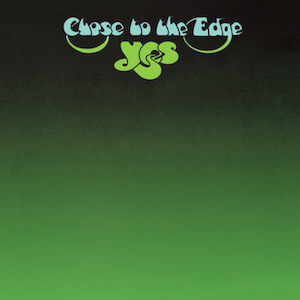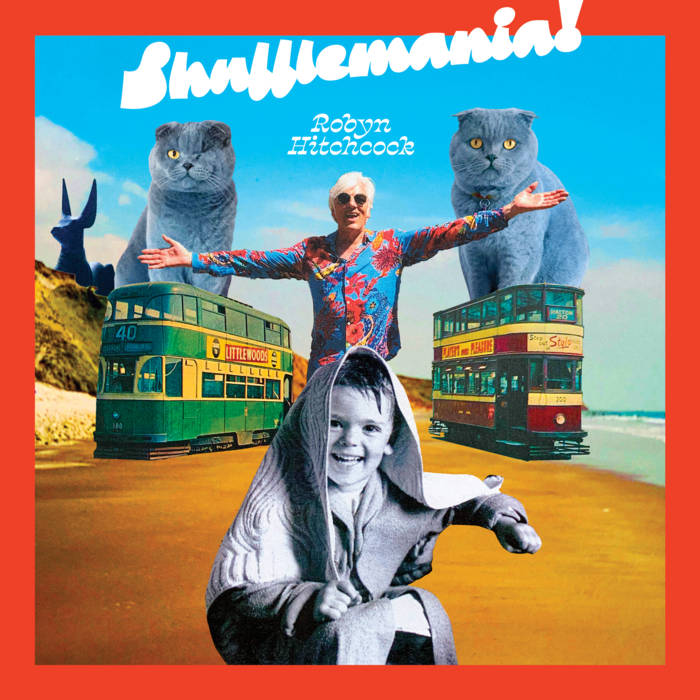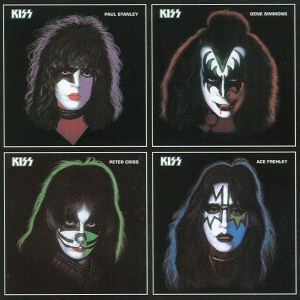
Seemingly at full strength by retaining the same lineup for two straight albums, Yes put all they had into
Close To The Edge. To prove they weren’t kidding, the album consisted of one side-long epic backed with two other lengthy pieces to establish themselves as
the prog trailblazers. (The simple green cover with the band photos on the back—including one shot of co-producer Eddy Offord—may seem oddly ordinary, but fear not: a trademark Roger Dean landscape takes up the gatefold.)
After bird song and water effects fade in, the instrumentalists take a couple of minutes to see how fast they can play and still keep in sync, and eventually a theme emerges on Steve Howe’s guitar. This first part is titled “The Solid Time Of Change” and sports lyrics and a chorus that will recur in the others. The second part, “Total Mass Retain”, is similar musically, except that the chorus hooks are sung faster. Rick Wakeman’s organ takes over the earlier theme, and we move to the more ethereal “I Get Up I Get Down” interlude, which ruminates on that theme with interlocking vocals before a massive pipe organ provides a very churchy atmosphere. A bleepy synthesizer shifts the proceedings back to the original theme and the final “Seasons Of Man” portion. After eighteen minutes, the “I get up I get down” melody is something of a relief and a release, and too brief before a calliope brings back the birds and water.
While “Close To The Edge” may seem indulgent and an acquired taste, we can’t say the same for “And You And I”. For our money, this is the quintessential Yes track, from Steve’s initial harmonics to check his tuning while the organ provides a melodic bed, and then that wonderful 12-string intro. This song too has parts, beginning with “Cord Of Life” over three simple chords played ad infinitum until finally there’s a switch to a pre-chorus that sets up the transition to “Eclipse”, an almost symphonic theme. A simple (for them) Leslie effect on the guitar brings in a slower repeat of the chorus, which hangs there until the 12-string intro returns. “The Preacher, The Teacher” speeds up the musical themes to a more jaunty backing, eventually building up to the pre-chorus for a reprise of the “Eclipse” section, which reaches a fermata (look it up), and “The Apocalypse” is the odd title given to the final 45 seconds and the final chorus.
All that happens in ten minutes, but we’ve still got the rest of side two to go. While it’s certainly intricate and complicated, “Siberian Khatru” is comparatively straightforward and rocking. A strong guitar riff always helps, and the band comes in with a driving rhythm of its own while Howe tweedled-ee-dees on top. They keep the energy going for the duration, there’s a harpsichord solo, and the lyrics make absolutely no sense.
Close To The Edge is a lot of people’s favorite Yes album, which we can understand. There is a lot going on, and most of it is, well, edgy and distracting, so it’s not the type of thing we can throw on at any hour of the day. As we’ve probably said before, we do respect certain prog performers because it does take a lot of work to write lengthy compositions with multiple parts that fit together, and Yes does that here.
Naturally the album was expanded when its time came. It’s always interesting when bonus tracks outnumber an album’s original tracks; while the single version of their cover of Simon & Garfunkel’s “America” may seem redundant as the expanded Fragile included the full version, more interesting is the edit of “Total Mass Retain” used as its B-side. Early mixes of “And You And I” and “Siberian Khatru” just sound empty, because they are. Steven Wilson helmed the stereo and surround mixes for the later “definitive edition”, which had even more extras on the Blu-ray. He gave the album yet another new mix and an instrumental mix—which is frankly astounding—to go along with another remaster for the Super Deluxe Edition a decade later, which also included the extras from the other expansions, a few fresh edits, and two discs devoted to a Rainbow Theater concert already mined for the Yessongs album and film. (Note: the drummer on those discs is Alan White, who replaced the departed Bill Bruford.) A Blu-ray contained everything in hi-res, plus Rhino insisted on including the remaster on vinyl in the package as well.
Yes Close To The Edge (1972)—3½
2003 remastered CD: same as 1972, plus 4 extra tracks
2014 Definitive Edition: “same” as 1972, plus 2 extra tracks (plus DVD or Blu-ray)
2025 Super Deluxe Edition: same as 1972, plus 27 extra tracks (plus Blu-ray)
 We generally prefer Robyn Hitchcock albums either when he’s completely solo or playing with the same band on all tracks. In many cases, the albums that are pieced together from different sessions with rotating players don’t always succeed, but that can also be blamed on the songs. In the case of Shufflemania! however—though we’re still wondering how or if it’s supposed to related to another album—the scattered approach works. He’d already made the most of the 2020 pandemic to stay as creative as possible, and here he’s collaborated over the wires with 15 other players in as many studios. Some of these people include members of Wilco, the Raconteur who produced his last album, two former Soft Boys, Johnny Marr, Sean Lennon, and the lovely Emma Swift. He started with vocals and guitar, then had his guests fill in the rest.
We generally prefer Robyn Hitchcock albums either when he’s completely solo or playing with the same band on all tracks. In many cases, the albums that are pieced together from different sessions with rotating players don’t always succeed, but that can also be blamed on the songs. In the case of Shufflemania! however—though we’re still wondering how or if it’s supposed to related to another album—the scattered approach works. He’d already made the most of the 2020 pandemic to stay as creative as possible, and here he’s collaborated over the wires with 15 other players in as many studios. Some of these people include members of Wilco, the Raconteur who produced his last album, two former Soft Boys, Johnny Marr, Sean Lennon, and the lovely Emma Swift. He started with vocals and guitar, then had his guests fill in the rest.




